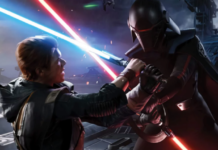If nothing else, Star Wars: The Last Jedi charted a course for films under the brand’s banner going forward. While it didn’t satisfy every fan out there (an impossible task anyway), Director Rian Johnson has found himself on the defensive over the details, some of which that aren’t even in the movie.
WARNING! SPOILERS FOR STAR WARS: THE LAST JEDI FOLLOW!!!!!!
There was a general expectation that Han Solo would get some sort of send-off in The Last Jedi since he has been a revered figure in the franchise since its inception in the late 70’s. That was not the case as the film did something that no other in the series had by taking place literally seconds after the last one ended, and as a result, it’s moment carried it forward in a way that didn’t allow for a Solo funeral to happen.
In fact, it was never even under consideration in the first place. Rian Johnson explained the thought process in an interview with Collider.
“Pacing-wise it didn’t have a place,” Johnson said. “It’s tough in Star Wars because I always think about the mourning that Luke gives to Ben’s death, which is all of four-and-a-half seconds before, ‘Come on kid we’re not out of this yet’ and then boom, you’re into ‘Yay, woo-hoo! Don’t get cocky!’”
“That’s kind of the thing of Star Wars; you don’t really linger on grief because you’re moving forward,” he continued.
However, it’s not as if The Last Jedi completely ignores Solo’s death. There’s a moment in the film where the camera fixates on Leia for an extra moment to help convey the impact of his death without words.
“I really held onto that moment of Leia before they come out of hyperspace, just that moment of feeling the weight of the world on her shoulders,” he said.
Luke Skywalker is also used as a vessel of mourning when he steps back onto the Millenium Falcon for the first time in what is likely decades and takes the dice in his hands. Plus, there’s the moment at the end of the film when he “returns the dice” (but not really) to Leia. Simply put, there are a lot of small nods to Han Solo rather than a singular major one.







